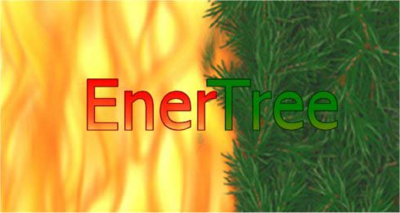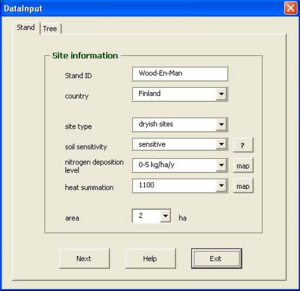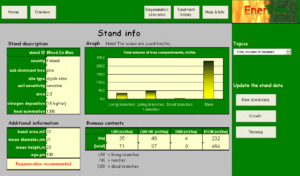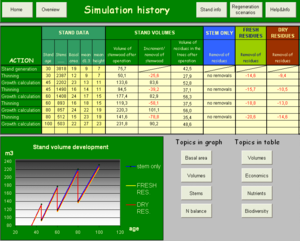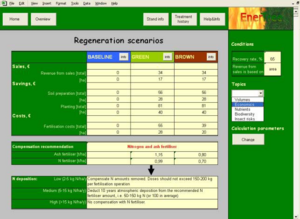Difference between revisions of "EnerTree"
Acovefonyva (Talk | contribs) |
Ola Eriksson (Talk | contribs) |
||
| (One intermediate revision by one user not shown) | |||
| Line 1: | Line 1: | ||
| − | |||
| − | |||
| − | |||
| − | |||
| − | |||
| − | |||
| − | |||
| − | |||
== General System description == | == General System description == | ||
| Line 14: | Line 6: | ||
The EnerTree [[:Category:Decision support system|decision support program]] is a unique tool concerning the utilisation of forest fuel for energy production. It aims to assist the forest owners to decide whether they should harvest forest residues on their forest site and, if they decide to do so, what fuel recovery option will be the most beneficial for them. | The EnerTree [[:Category:Decision support system|decision support program]] is a unique tool concerning the utilisation of forest fuel for energy production. It aims to assist the forest owners to decide whether they should harvest forest residues on their forest site and, if they decide to do so, what fuel recovery option will be the most beneficial for them. | ||
| − | |||
[[Category:Decision support system]] | [[Category:Decision support system]] | ||
[[Category:Supranational DSS]] | [[Category:Supranational DSS]] | ||
| − | |||
| − | |||
| − | |||
| − | |||
| − | |||
| − | |||
| − | |||
| − | |||
| − | |||
| − | |||
| − | |||
| − | |||
| − | |||
| − | |||
| − | |||
| − | |||
| − | |||
| − | |||
[[Image:EnerTree_logo.png|thumb|400px|EnerTree logo]] | [[Image:EnerTree_logo.png|thumb|400px|EnerTree logo]] | ||
| Line 71: | Line 44: | ||
=== Related systems === | === Related systems === | ||
| − | This decision support tool is part of the Wood-En-Man (wood for energy — a contribution to the development of sustainable forest management) project, which is a joint project of seven different research institutes in seven different countries | + | This decision support tool is part of the Wood-En-Man (wood for energy — a contribution to the development of sustainable forest management) project, which is a joint project of seven different research institutes in seven different countries<ref>[http://www.flec.kvl.dk/wood-en-man/ Wood-En-Man project website]</ref>. |
| Line 92: | Line 65: | ||
Based on the input data, a diameter distribution for the forest stand is estimated with the 3-parameter Weibull-function. Thus, the distribution enables the calculation of the stand characteristics on a tree level for each diameter class utilizing tree-level models. | Based on the input data, a diameter distribution for the forest stand is estimated with the 3-parameter Weibull-function. Thus, the distribution enables the calculation of the stand characteristics on a tree level for each diameter class utilizing tree-level models. | ||
| − | The current version of the program deals with monocultures of Scots pine ([[:Category:Pinus sylvestris|Pinus sylvestris]]) and Norway spruce ([[:Category:Picea abies|Picea abies]]), but in the future Sitka spruce ([[:Category:Picea sitchensis|Picea sitchensis]]) and Lodgepole pine ([[:Category:Pinus contorta|Pinus contorta]]) will also be options | + | The current version of the program deals with monocultures of Scots pine ([[:Category:Pinus sylvestris|Pinus sylvestris]]) and Norway spruce ([[:Category:Picea abies|Picea abies]]), but in the future Sitka spruce ([[:Category:Picea sitchensis|Picea sitchensis]]) and Lodgepole pine ([[:Category:Pinus contorta|Pinus contorta]]) will also be options<ref>PASANEN, K., I. STUPAK, D. RÖSER, A. ASIKAINEN et K. RAULUND-RASMUSSEN (2008): EnerTree – Decision Support Tool To Analyse Forest Biomass Extraction Scenarios. In RÖSER, D., A. ASIKAINEN, K. RAULUND-RASMUSSEN et I. STUPAK (Eds.): ''Sustainable Use of Forest Biomass for Energy: a Synthesis with Focus on the Baltic and Nordic Region''. Dordrecht: Springer.</ref>. |
| Line 108: | Line 81: | ||
The parameters that can be compared are: | The parameters that can be compared are: | ||
| − | {| border = | + | {| border ="1" |
!Volumes !! Economics !! Nutrients !! Biodiversity !! Other | !Volumes !! Economics !! Nutrients !! Biodiversity !! Other | ||
| − | |- align= | + | |- align="left" |
|Amount of residues || Revenue from sales || Contents and balance of nutrients || Effect of woodfuel harvesting on biodiversity || Insect pests | |Amount of residues || Revenue from sales || Contents and balance of nutrients || Effect of woodfuel harvesting on biodiversity || Insect pests | ||
| − | |- align= | + | |- align="left" |
|Energy potential || Saving/costs due to woodfuel harvesting || Removal of nutrients || Recommendations || Carbon contents and fluxes | |Energy potential || Saving/costs due to woodfuel harvesting || Removal of nutrients || Recommendations || Carbon contents and fluxes | ||
| − | |- align= | + | |- align="left" |
| || Subsidies for silviculture and woodfuel harvesting || Need of compensation fertilization || || Fossil fuel savings | | || Subsidies for silviculture and woodfuel harvesting || Need of compensation fertilization || || Fossil fuel savings | ||
|} | |} | ||
| Line 120: | Line 93: | ||
EnerTree not only show comparative values, the program provides the user with a recommendation whether or not the residues should be harvested due to the soil conditions and if it is necessary to fertilize the stand after the harvesting operation. | EnerTree not only show comparative values, the program provides the user with a recommendation whether or not the residues should be harvested due to the soil conditions and if it is necessary to fertilize the stand after the harvesting operation. | ||
| − | Besides, there is a | + | Besides, there is a "Help and Info" section that provides the users with a great amount of information and a photo gallery illustrating the forest residues harvesting process and its consequences. |
=== Typical temporal scale of application === | === Typical temporal scale of application === | ||
| Line 157: | Line 130: | ||
===Cited references=== | ===Cited references=== | ||
| − | + | <references/> | |
===External resources=== | ===External resources=== | ||
Latest revision as of 06:56, 14 October 2012
General System description
System name: EnerTree
Brief overview
The EnerTree decision support program is a unique tool concerning the utilisation of forest fuel for energy production. It aims to assist the forest owners to decide whether they should harvest forest residues on their forest site and, if they decide to do so, what fuel recovery option will be the most beneficial for them.Contents
Scope of the system
The main objective of the DSS is to give the non-industrial forest owners comprehensive information about the benefits and limitations of different forest fuel harvesting options. The program should lead the forest owner to get sufficient information for making a sound decision. Supported by the latest research results produced as part of the Wood-En-Man project as well as other projects, the program acts as an outlet of this latest research results.
The decision support program aims to act as a set of guidelines for forest residues harvesting, taking ecological aspects into consideration, warning of excessive nutrient depletion and recommending fertilization when required.
System origin
- It was developed by the Finnish Forest Research Institute (Metla).
- Currently is available for Finnish forests, but it aims to be extended to all the other countries belonging to the Wood-En-Man project as soon as models from this countries become available.
Support for specific issues
This DSS cares for forest residues harvesting and its consequences.
Support for specific thematic areas of a problem type
- Silvicultural
- Certification
- Conservation
- Restoration
- Development choices / land use zoning
- Policy/intervention alternatives
- Sustainability impact assessment (SIA)
Capability to support decision making phases
- Intelligence:
- at this moment forest managers have a large number of options forest fuel management, but they have limited knowledge of the potential impact of these options on the forest ecosystems.
- Design:
- different harvesting management alternatives are seen.
- Choice:
- different results are shown for each feasible solution.
- Monitor:
- not included.
Related systems
This decision support tool is part of the Wood-En-Man (wood for energy — a contribution to the development of sustainable forest management) project, which is a joint project of seven different research institutes in seven different countries[1].
Data and data models
Typical spatial extent of application
Results are shown at a stand level.
Type of information input from user (via GUI)
Location, site, and stand data are provided by users following dialog boxes' instructions. Then, the silvicultural treatment of the stand is chosen among two possibilities: immediate harvesting, or stand growing till reaching a maturity age and then carrying out the harvesting. Also, some parameters such as prices of timber and residues, costs of regeneration, or the technical effectiveness of residues recovery can be modified.
Models
Forest models
Based on the input data, a diameter distribution for the forest stand is estimated with the 3-parameter Weibull-function. Thus, the distribution enables the calculation of the stand characteristics on a tree level for each diameter class utilizing tree-level models.
The current version of the program deals with monocultures of Scots pine (Pinus sylvestris) and Norway spruce (Picea abies), but in the future Sitka spruce (Picea sitchensis) and Lodgepole pine (Pinus contorta) will also be options[2].
Outputs and Decision Support
Definition of management interventions
Four forest owners alternatives, scenarios, are evaluated:
- no extraction of residues
- extraction of fresh residues (branches and needles)
- extraction of fresh residues and fertilization
- extraction of dried residues (only branches, without needles)
So, forest owners can compare these alternatives under economical and ecological criteria, leading them to choose the best available solution. The parameters that can be compared are:
| Volumes | Economics | Nutrients | Biodiversity | Other |
|---|---|---|---|---|
| Amount of residues | Revenue from sales | Contents and balance of nutrients | Effect of woodfuel harvesting on biodiversity | Insect pests |
| Energy potential | Saving/costs due to woodfuel harvesting | Removal of nutrients | Recommendations | Carbon contents and fluxes |
| Subsidies for silviculture and woodfuel harvesting | Need of compensation fertilization | Fossil fuel savings |
EnerTree not only show comparative values, the program provides the user with a recommendation whether or not the residues should be harvested due to the soil conditions and if it is necessary to fertilize the stand after the harvesting operation.
Besides, there is a "Help and Info" section that provides the users with a great amount of information and a photo gallery illustrating the forest residues harvesting process and its consequences.
Typical temporal scale of application
Operational and tactical planning.
Types of decisions supported
- Management level
- administrative decisions
- operating control decisions
- Management function
- planning decisions
- organizing decisions
- command decisions
- control decisions
- coordination decisions
System
System requirements
- Operating Systems: Microsoft® Windows® OS
- Other software needed: Microsoft® Excel®
- Development status: version 2.0 is finished
Architecture and major DSS components
EnerTree is built within Microsoft Excel using Visual Basic® for Applications (VBA).
Usage
The main objective users of the program are forest owners, nevertheless, scientific community, forestry students, forest industries and legislators might found it appealing.
User interface
EnerTree tries to show a friendly interface, and does not require lot of knowledge, being data input requirements easily available at forest management plans or similar documents.
References
Cited references
- ↑ Wood-En-Man project website
- ↑ PASANEN, K., I. STUPAK, D. RÖSER, A. ASIKAINEN et K. RAULUND-RASMUSSEN (2008): EnerTree – Decision Support Tool To Analyse Forest Biomass Extraction Scenarios. In RÖSER, D., A. ASIKAINEN, K. RAULUND-RASMUSSEN et I. STUPAK (Eds.): Sustainable Use of Forest Biomass for Energy: a Synthesis with Focus on the Baltic and Nordic Region. Dordrecht: Springer.
External resources
- PASANEN, K. (2005): EnerTree - A Decision Support Tool for Forest Energy Utilisation. Biomass Production: Energy from Forestry and Agriculture. Elgin, Scotland 21st-22nd November 2005 (Oral communication) (pdf avialable).
- PASANEN, K., I. STUPAK, D. RÖSER, A. ASIKAINEN et K. RAULUND-RASMUSSEN (2008): EnerTree – Decision Support Tool To Analyse Forest Biomass Extraction Scenarios. In RÖSER, D., A. ASIKAINEN, K. RAULUND-RASMUSSEN et I. STUPAK (Eds.): Sustainable Use of Forest Biomass for Energy: a Synthesis with Focus on the Baltic and Nordic Region. Dordrecht: Springer.
- RÖSER, D., K. PASANEN, et A. ASIKAINEN (2006): Decision-support program ‘‘EnerTree’’ for analyzing forest residue recovery options. Biomass and Bioenergy, 30, 326–333.
